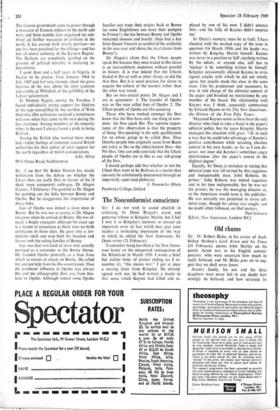The Nonconformist conscience
Sir: I do not wish to sound churlish in criticising Sir Denis Brogan's warm and generous tribute to Kingsley Martin, but I feel I owe it to Kingsley's memory to correct an important error of fact which may give your readers a misleading impression of the way in which he edited the New Statesman. Sir Denis writes (21 February): 'I remember being horrified at the New States- man leader on the unopposed reoccupation of the Rhineland in March 1936. I wrote a brief but violent letter of protest ending (as I re- member it), "this means war." I got at once a moving letter from Kingsley. He entirely agreed with me; he had written a leader in that sense which Keynes had killed and re- placed by one of his own. I didn't censure him—and the folly of Keynes didn't surprise me.'
Sir Denis's memory must be at fault. I have checked with the marked copy of the issue in question (14 March 1936) and the leader was written by Kingsley Martin himself. Keynes was never in a position to 'kill' anything written by the editor, or anyone else, still less to 'replace' it by something written by himself. Kingsley occasionally allowed Keynes to write signed articles with which he did not wholly agree, but usually made this clear in the same issue. Like his predecessor and successors, he was in sole charge of the editorial content of the paper and brooked no interference by any member of the board. His relationship with Keynes was, I think, accurately summarised by Edward Hyams in his The New Statesman: the History of the First Fifty Years:
'Maynard Keynes seems to have been the only director who tried to take a hand in the paper's editorial policy, but for years Kingsley Martin managed this situation with great 'kill, in such a way that he could take advantage of Keynes's positive contribution while retaining absolute control in his own hands; so far as I can dis- cover, not once did Keynes's sometimes angry interferences alter the paper's course in the slightest degree.'
Equally, Sir Denis is mistaken in stating that editorial copy was 'all revised by that sagacious and indispensable man, John Roberts, the printer.' John Roberts was indeed sagacious and in his time indispensable, but he was not the printer; he was the managing director or, as the Americans would term it, the publisher. He was certainly not permitted to revise edi- torial copy, though his advice was sought, and no doubt often followed, on libel matters.


































 Previous page
Previous page